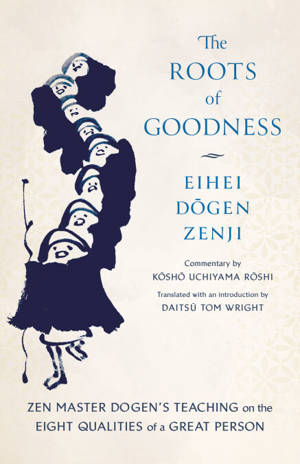
- Afhalen na 1 uur in een winkel met voorraad
- Gratis thuislevering in België vanaf € 30
- Ruim aanbod met 7 miljoen producten
- Afhalen na 1 uur in een winkel met voorraad
- Gratis thuislevering in België vanaf € 30
- Ruim aanbod met 7 miljoen producten
Zoeken
The Roots of Goodness E-BOOK
Zen Master Dogen's Teaching on the Eight Qualities of a Great Person
Kosho Uchiyama Roshi, Eihei Dogen
E-book | Engels
€ 22,62
+ 22 punten
Omschrijving
Learn to nurture the eight qualities of an extraordinary person within yourself through the wisdom of Zen master Dōgen.
The Buddha taught that every person is capable of greatness by practicing eight key qualities in their life, from having few desires and not engaging in useless arguments to knowing what is enough. These timeless teachings were later expanded upon by the prolific thirteenth-century Zen master Eihei Dōgen in his final teaching before his death—values that, despite their age, perennially ring true.
In The Roots of Goodness, the late Japanese Zen teacher Kōshō Uchiyama Röshi bridges the gap between the eras of these ancient masters and today, delivering insightful, relatable, and rich commentary that brings these eight qualities into focus and directly applies them to the complexities of modern life. Translator Daitsū Tom Wright, a longtime student of Uchiyama, provides a full translation of Dōgen’s original work as well as a faithful translation of Uchiyama’s commentary, supplemented with a historical background of Dōgen, an exploration of how the teaching of the eight qualities impacted Uchiyama’s life and work, and a personal introduction that grounds the importance of this teaching in modernity. This book seamlessly weaves together ancient wisdom with Uchiyama’s beloved humor and style, offering a path for using these qualities to more fully embrace Buddhist practice and answer the age-old question: How does one become a truly good person?
The Buddha taught that every person is capable of greatness by practicing eight key qualities in their life, from having few desires and not engaging in useless arguments to knowing what is enough. These timeless teachings were later expanded upon by the prolific thirteenth-century Zen master Eihei Dōgen in his final teaching before his death—values that, despite their age, perennially ring true.
In The Roots of Goodness, the late Japanese Zen teacher Kōshō Uchiyama Röshi bridges the gap between the eras of these ancient masters and today, delivering insightful, relatable, and rich commentary that brings these eight qualities into focus and directly applies them to the complexities of modern life. Translator Daitsū Tom Wright, a longtime student of Uchiyama, provides a full translation of Dōgen’s original work as well as a faithful translation of Uchiyama’s commentary, supplemented with a historical background of Dōgen, an exploration of how the teaching of the eight qualities impacted Uchiyama’s life and work, and a personal introduction that grounds the importance of this teaching in modernity. This book seamlessly weaves together ancient wisdom with Uchiyama’s beloved humor and style, offering a path for using these qualities to more fully embrace Buddhist practice and answer the age-old question: How does one become a truly good person?
Specificaties
Betrokkenen
- Auteur(s):
- Vertaler(s):
- Uitgeverij:
Inhoud
- Aantal bladzijden:
- 272
- Taal:
- Engels
Eigenschappen
- Productcode (EAN):
- 9780834846128
- Verschijningsdatum:
- 17/02/2025
- Uitvoering:
- E-book
- Beveiligd met:
- Adobe DRM
- Formaat:
- ePub

Alleen bij Standaard Boekhandel
+ 22 punten op je klantenkaart van Standaard Boekhandel
Beoordelingen
We publiceren alleen reviews die voldoen aan de voorwaarden voor reviews. Bekijk onze voorwaarden voor reviews.







